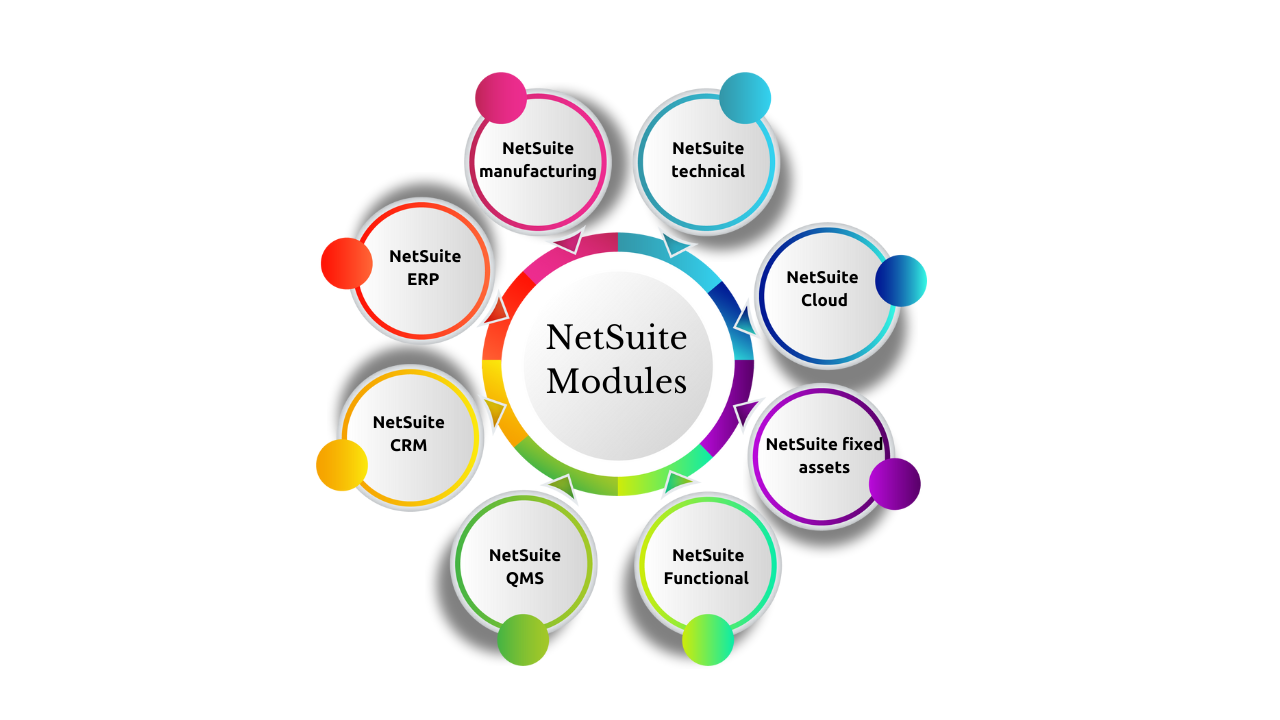An Overview of the Different NetSuite Modules
Hi, Geeks!
In the previous blog post, we gained a better understanding of What NetSuite is. We learned a few things and expanded our knowledge.
Let’s go into greater detail regarding the various NetSuite Modules right now, shall we?
About NetSuite Software
NetSuite is a cloud-based, software-as-a-service (SaaS) business management suite available to small and medium sized businesses. NetSuite provides its users with financial management capabilities, including invoicing and billing, and inventory management.
It also offers business intelligence tools that provide stats and reporting to users, and an ERP to manage your entire business from one unified platform.
With all of these features, NetSuite can be a bit overwhelming because there are so many things you would need to get started and keep running. To help you get started faster, we have put together a list of NetSuite tips and tricks to help you get the most out of your NetSuite software.
Features of NetSuite ERP
NetSuite is an all-in-one cloud business management suite that helps organizations operate more effectively by automating core processes and providing real-time visibility into operational and financial performance.
With a single, integrated suite, businesses can streamline and optimize processes, from financials to supply chain to order management to information technology.
Additionally, NetSuite ERP offers a number of integrated modules that allow businesses to manage all of their key business processes, including supply chain management, order management, financial management and more.
In addition to its integrated modules, NetSuite ERP offers a number of powerful features that allow businesses to customize the system to meet their specific business needs.
NetSuite supports all major currencies, and multiple languages, allowing businesses to manage their entire business operations globally.
List of NetSuite Modules

NetSuite has a large library of integrated modules that can be used to enhance business process efficiency and increase customer satisfaction.
NetSuite modules can be broken down by subject area, including accounting, sales, HR, inventory and more. There are also theme-based modules that feature a consistent design and unique feature set.
While NetSuite offers a wide range of features and functionality, anyone looking to launch a business can use NetSuite modules. NetSuite extensions, SuiteApps, NetSuite apps, or NetSuite supplements, these extensions and apps provide additional functionality and power to the NetSuite platform.
NetSuite ERP Modules
NetSuite is a cloud-based ERP software that supports a number of business functions including financial management, CRM, ecommerce, inventory management, and more.
Within the NetSuite ERP, there are several specific modules that can be utilized to fit your business needs.
NetSuite ERP offers a wide range of features and functionality that can be customized to fit your business needs. With its cloud-based architecture, NetSuite ERP is accessible from anywhere that has an internet connection.
This allows employees to be more efficient and effective while working from home, on a plane, or in another country.
NetSuite has developed customized software for financial analysis and conversion tracking, accounting analysis, credit card conversion tracking, inventory management, project management, and new unit of measure management. The cloud-based architecture also allows for all employees to access the same data.
NetSuite ERP Tutorial for Beginners
NetSuite is a unified business management suite encompassing ERP, financials and accounting, CRM, and eCommerce. NetSuite provides a cloud-based platform that can be accessed from anywhere at any time.
NetSuite ERP provides a suite of applications that help companies operate efficiently and improve productivity. It offers financials and accounting, CRM, eCommerce, and supply chain management functions in a single cloud platform.
It is the most popular cloud ERP system in the world. NetSuite is a lot more than just a financial management system. NetSuite CRM, and other cloud business software services.
We have developed a set of NetSuite ERP tutorial videos to help you start or manage a business on NetSuite ERP.
Oracle NetSuite Cloud ERP
Oracle NetSuite cloud ERP is the world’s leading provider of cloud-based business management software.
Building upon the Oracle Enterprise Resource Planning ERP system, NetSuite offers a full suite of cloud-based financials, accounting, and supply chain management solutions.
These technologies can be used to improve operational efficiency and reduce costs. In addition, since the software is hosted on a cloud server, users can access their data from anywhere.
NetSuite offers its solutions to midmarket and enterprise companies, as well as public entities. NetSuite features and tools. NetSuite ERP is made up of ERP, Suite Commerce Advanced, and Suite Analytics.
The system includes all the functionalities like financial management, revenue management, inventory management, order management, billing, ecommerce, and CRM. The NetSuite Cloud ERP system has a wide range of customers across the world.
To enable the NetSuite cloud architecture, the system needs to be deployed.
There are various deployment options like on-premise, hybrid, and cloud-app. The deployment method is selected based on the size of the business, its complex processes, and its revenue. The user can access NetSuite online, through a web browser.
However, to access NetSuite ERP, the system needs to be installed on the computer. The installed file is known as the web browser extension.
There are many web browser extensions available in the NetSuite ERP web browser. For example, for chrome, for fire fox, for internet explorer, and for safari. These extensions help the users in creating customized tabs in the web browser.
These tabs help the users to access NetSuite easily. The main features are shown in the dashboard of the user. Through this dashboard, the user can get various reports and data about the business processes.
NetSuite Manufacturing Module
NetSuite manufacturing modules is a crucial component to the success of your business. NetSuite marts you save a lot of time and money which can be used to further improve your business operations.
With NetSuite manufacturing modules, you can also ensure consistency and accuracy while producing your products and thus ensure product quality. Customer Relationship Management
NetSuite fixed Assets Module
Fixed assets are assets that are fixed in place, such as machinery, and do not need to be constructed to build or change location.
The NetSuite fixed assets module in NetSuite ERP allows you to track the cost and revenue associated with fixed assets, as well as the cost and revenue associated with the actual location’s they are used in.
You can also track the date that you expect to work on a particular fixed asset, known as the fixup sum.
When you fix the actual asset, you can also track the date that you expect to work on the location where the asset is used, known as the fix update. The NetSuite fixed assets module in
NetSuite ERP provides a basic interface for users to enter and view fixed asset data. The user can enter additional details or customize the standard interface to meet their specific needs. You can use the NetSuite fixed assets module to manage and track fixed assets in your business operations.
With this module, you can track both fixed asset data as well as location vessel, machine, and warehouse data.
You can also track the date that you expect to work on a particular location, known as the fix update.
NetSuite CRM Module
NetSuite CRM is a module that enables you to manage your customer relationships and activities within NetSuite. With NetSuite CRM, you can track your customers’ requirements and plan your efforts to meet their needs.
You can also track your customers’ financial information to ensure that you are not missing out on any opportunities. NetSuite CRM also enables you to manage your sales pipeline and track your sales opportunities. In addition, this module can help you improve your customer service standards. Quality Management
NetSuite QMS Module
NetSuite QMS is a module that enables you to manage your business’s quality procedures and standards. With NetSuite QMS, you can track your products and ensure that they meet your quality standards. You can also create workflows for your employees to follow while producing products.
NetSuite Technical Module
NetSuite SuiteTalk Documentation
NetSuite SuiteTalk Scripting and Automation API connects to your NetSuite account and make changes at the record level. This includes fields, records, and custom record types.
In addition, you can use the NetSuite SuiteTalk & SuiteField API to enable custom fields on records and custom record types in your NetSuite account.
NetSuite SuiteTalk documentation helps to generate PHP classes that correspond to any set of NetSuite API Documentation URLs. The PHP SDK contains a default set of API Documentation URLs for generated classes.
NetSuite Scripting Tutorial
NetSuite scripting is a script or set of scripts that allow you to automate highly customized or routine tasks in NetSuite. These can be scripts created in other programming languages and integrated into NetSuite using SuiteScript, or scripts created in NetSuite using JavaScript.
NetSuite scripting is a tool that allows developers to customize the user interface to create fields, workflows, and other features.
NetSuite scripting is ideal for developers and for users with more specialized needs. When writing a script, you work directly with the database.
NetSuite Suitelet Tutorial
NetSuite is built to scale with your business as it grows. NetSuite is the only cloud ERP that provides real time visibility into your business for effective decision making. This helps companies to manage their business effectively.
The NetSuite Suitelet tool is built in such a way that it is easy to integrate with other software. The NetSuite Suitelet tool is very useful for companies as it can be used for integrating with third party applications.
NetSuite SuiteScript Documentation
It is recommended to watch the videos at the end of this article.
NetSuite Functional Module
Integrating NetSuite Functional with your business can be very helpful because of the following reasons.
Accessing data easily.
Better management.
Reduce the number of tools you are using.
More flexibility and ease of use.
There is a lot of benefits you will get once you have integrated NetSuite Functional with your business.
Now let us see the different steps you are going to do for integrating NetSuite Functional with your business. Steps to integrate NetSuite ERP with your business
- Create New Project in NetSuite ERP.
- Customization and Integration.
- Applied Solutions.
- Review and Set Up the Approval Workflow.
- Setup Currency Management.

Saniya
Author
“Life Is An Experiment In Which You May Fail Or Succeed. Explore More, Expect Least.”



